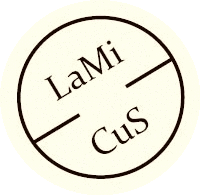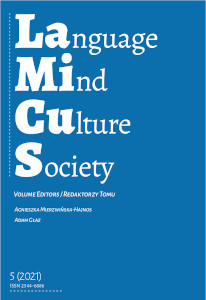LaMiCuS 5 (2021)
Table of contents / Spis treści
Od Redakcji 8-10
Articles / Artykuły
John Newman, Singular and plural preferences among adjectival collocates of CAT and DOG, 12-32
The singular vs. plural distinction in English count nouns is not usually considered as being of any real consequence to the choice of adjectives accompanying these nouns. This study questions this assumption and explores the pre-nominal adjectives occurring with cat/cats and dog/dogs with
a view to identifying the main patterns of co-occurrence with singular forms vs. plural forms. Attributive adjectives occurring before cat(s) and dog(s) were investigated, relying on a corpus of contemporary American fiction. Applying Distinctive Collexeme Analysis to the corpus results, it was found that coherent groups of adjectives occurred preferentially with the singular or plural of both words. Colour adjectives and evaluative adjectives like good, for example, occurred preferentially with the singular forms, while adjectives such as stray, wild, and feral occurred preferentially with plural forms. The usage differences observed in the data can be motivated by reference to a folk model of the world in which animals take their place as house pets, wild animals, or somewhere in between.
Keywords: singularity, plurality, nouns, adjectives, corpus
Alice Mevis,
Prototype effects behind French loans in Middle English: A cognitive account of lexical borrowing, 34-56
It is a well-established fact that the Norman Conquest profoundly transformed the English society and had a significant impact on the course of evolution of its language. As a result of the peculiar situation of English, French and Latin trilingualism in medieval England, Middle English displayed a reorientation of its strategies for word creation, by increasingly relying on lexical borrowing. The presence of Romance-derived loanwords thus introduced some degree of onomasiological variation into the language, so that the coexistence of native and foreign lexical resources would eventually become a recurring feature of Middle English. Within this well-researched area, the prototype aim of this paper is to explore the contribution of Cognitive Semantics, and more specifically of prototype theory, to French lexical borrowing, and to investigate the many ways in which may help account for the integration of loanwords into the English lexicon – or conversely, for the retention of native vocabulary. First of all, the substitution of cultural models
made for rather swift changes into the lexicon, as loanwords were introduced to better reflect the new cultural prototypes. Prototypicality can also work both within lexical categories at the prototypicality intensional level, as a differentiating factor between near-synonyms, and across categories at
the extensional level, in the restructuration of category members around an onomasiologically salient concept. The objective of this paper is thus to show how prototypicality comes into play at various levels in processes of semantic change, and how prototype theory can therefore be deemed a relevant framework for the analysis of loanwords.
Keywords: semantics, lexical change, lexical prototypicality, onomasiology, Middle English, prototypicality
Przemysław Wilk, ‘Rocking the boat’ and ‘putting spanners in the works’: On different metaphorical conceptualizations of the European Union, 58-76
The article aims to analyze dif ferent metaphorical conceptualizations of the European Union in The Guardian discourse. The corpus of news texts subject to analysis comes from a manually compiled 930,000-word corpus of news articles, retrieved from The Guardian from May 2004 through December 2009. The analysis focuses on four most frequent metaphors identified in the corpus, namely, THE EU IS A HOUSE and THE EU IS AN ELITE CLUB, which are used in the context of the accession of new countries to the EU and the related problem of immigration, as well as THE EU IS A BOAT and THE EU IS A MACHINE, which are embedded in the context of internal EU tensions concerning home affairs. The analysis and discussion of the four metaphorical conceptualizations of the EU is carried out with metaphor operationalized as a framing device in discourse, whose main function is to impose a particular axiologically-charged and ideology-laden construal of a participant/event in discourse..
Keywords: conceptualization, conceptual metaphor, framing, European Union
Łukasz Wiraszka, A Cognitive Linguistics account of viewpoint in academic prose, 76-100
This article is concerned with viewpoint-related phenomena in academic texts. Traditionally regarded as a highly impersonal type of communication, academic prose has recently drawn the attention of researchers exploring manifestations of author subjectivity and a growing body of linguistic research has demonstrated that research articles, monographs, university textbooks, etc. are far from objective or “faceless” acts of communication. Since Cognitive Linguistics is particularly well suited to the study of subjective aspects of linguistic meaning, this paper argues for a Cognitive Linguistics approach to the study of viewpoint in academic texts and proposes a model of viewpoint based on Langacker’s Cognitive Grammar designed specifically for the study of academic discourse. The model encompasses three aspects of viewpoint: vantage point, subjectivity and the conceptualizer’s identity. The discussion is illustrated with linguistic material from Cognitive Linguistics articles and monographs and, hopefully, demonstrates the relevance of Cognitive Linguistics research into viewpoint-related conceptual phenomena in academic discourse.
Keywords: viewpoint, academic discourse, subjectivity, cognitive grammar
Pola Włodarczyk, Humor a perspektywa oglądu świata w felietonach Michała Rusinka, 102-124
Celem artykułu jest ukazanie relacji między mechanizmami humoru, użytymi przez Michała Rusinka, a perspektywami oglądu świata, które pisarz przyjmuje w swoich felietonach. Na podstawie analizy środków językowych zastosowanych przez Michała Rusinka w felietonach ze zbioru Pypcie na języku, autorka przedstawia mechanizmy i typy humoru, głównie w świetle teorii niespójności, oraz rożne perspektywy oglądu świata. Pierwsza część prezentuje wyniki analizy humoru w tekstach ze zbioru Pypcie na języku, których śmieszność oparta jest na niespójnościach skryptów sygnalizowanych na różnych płaszczyznach systemu językowego. Druga część przedstawia punkty widzenia przyjęte przez Rusinka – krzyżujące się perspektywy zdezorientowanego i przeciętnego użytkownika języka, teoretyka i historyka literatury, znawcy myśli filozoficznej, „strażnika” poprawności językowej, dokumentalisty, poszukiwacza nowości językowych i ich przyczyn, obserwatora oraz komentatora realiów społecznych, politycznych i kulturowych. Ponadto spostrzec można także dwie inne, ogólniejsze perspektywy oglądu świata – narratora zmieniającego punkty widzenia oraz obserwowanych i ocenianych użytkowników języka. Analiza wykazuje, że użyte środki językowe, wyznaczające mechanizmy humoru, współbrzmią z przyjętymi perspektywami oglądu świata. Kreacja pisarza zmienia się w zależności od zastosowanych środków językowych, a razem z tą kreacją zmienia się humor, jakim się on posługuje.
Słowa kluczowe: humor, teoria niespójności, językowy obraz świata, perspektywa oglądu świata, punkt widzenia
Review article / Artykuł recenzyjny
Agnieszka Libura, Daria Bębieniec i Hubert Kowalewski (red.) 2018: Dociekania kognitywne. Kraków: UNIVERSITAS. ISBN 97883-242-3163-8, 126-144
Reviewed by Waldemar Skrzypczak
Reviews / Recenzje
Marcello Giovanelli and Chloe Harrison 2018: Cognitive Grammar in Stylistics: A Practical Guide. Bloomsbury Publishing. ISBN: 9781474298926 (Hb), 146-155

